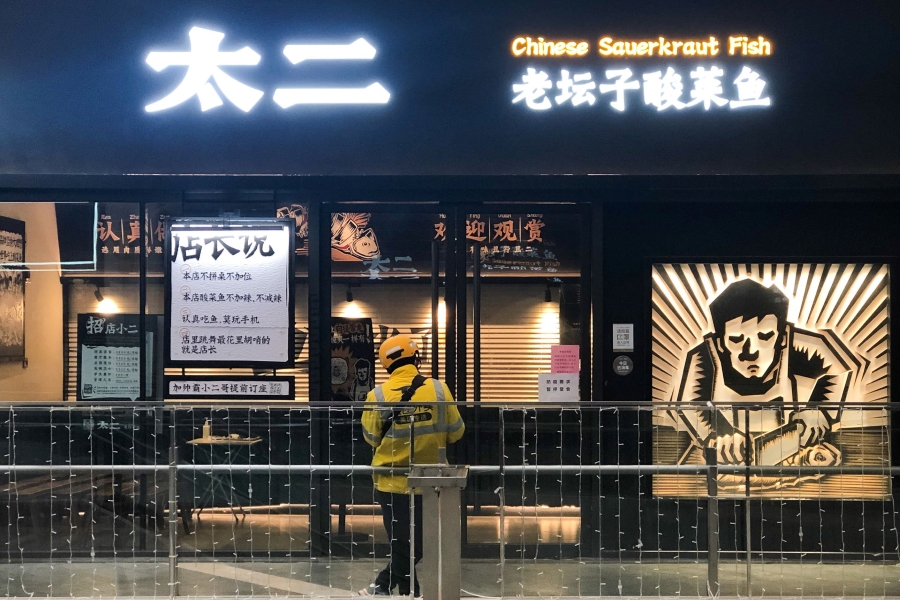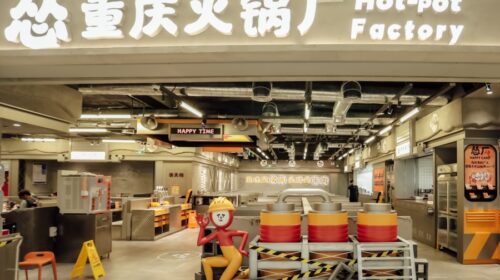Tumbling Profits Fail to Slow Jiumaojiu’s Appetite for Expansion

The restaurant chain known for its Tai Er brand of ‘sauerkraut fish’ said its profit fell 70% in the first half of the year on Covid disruptions and a rapid expansion
Key Takeaways:
- Jiumaojiu warned its profit plummeted by 70.4% in the first half of the year due to pandemic disruptions and rising expenses from new store openings
- Company is valued much higher than its peers, reflecting investor optimism about its prospects
By Tina Yip
The past seven months have been a sour time for restaurants throughout China. Even investor darling Jiumaojiu International Holdings Ltd. (9922.HK), operator of a trendy chain serving a popular dish called “sauerkraut fish,” has been left with a bitter taste in its mouth, reflected by its warning last week that its profits tumbled in the first half of this year.
The warning nicely summarizes the woes that have plagued China’s restaurant industry, which has taken a hit from a continuous stream of lockdowns and other measures to contain Covid outbreaks across China in the first half of the year. Such measures forced people to stay at home and restaurants to close. As a result, China’s insistence on a “Zero Covid” policy has torpedoed many restaurant operators’ bank accounts to near-zero as well.
But even under the pandemic’s shadow, some chains are forging ahead with aggressive expansions to position themselves for better times in a post-pandemic world. Jiumaojiu falls into that category, setting up more of its Tai Er restaurants to reel in as much money as it can while the sauerkraut fish craze lasts.
The company warned last week that its half-year revenue will fall 6.1% year-on-year to 1.9 billion yuan ($280 million). But even more jaw-dropping was its forecast that its net profit would tumble up to 70.4% to 55 million yuan.
While such a warning usually pulls the rug from under a company’s shares, the forecast had just the opposite effect. Jiumaojiu’s stock actually jumped 4% in the three days after the announcement, partly due to a big influx of capital from hungry mainland investors.
Kenny Wen, head of investment strategy at KGI Asia, believes the market was expecting a big drop in Jiumaojiu’s performance since many of its stores were shuttered during the pandemic in the second quarter. Those concerns were reflected by a 24% drop in the company’s shares from HK$22.50 in late June to just HK$17 earlier this month.
Wen said Jiumaojiu’s stock has a good chance of bouncing back after China brings its latest Covid flareups under control and takes other steps to revive its stumbling economy.
Swimming against the tide
Jiumaojiu Chairman Guan Yihong, who started out as a noodle shop owner in South China’s Hainan island, said the Covid crisis offers hidden opportunities. While other restaurant chains have been scaling back to ride out the storm, he said Jiumaojiu added 37 stores, including 35 under the Tai Er brand and two under its Song Chongqing Hot Pot Factory brand. The move led to a jump in expenses, further eroding the company’s first-half profitability.
Tai Er and its signature “sauerkraut fish” catering to young urbanites has been the company’s big breadwinner in recent years. By the end of last year, the brand had 350 stores across China and its revenue surged by 67.3% to 3.29 billion yuan in 2021, accounting for 78.6% of Jiumaojiu’s total. Tai Er has easily beaten out the older Jiu Mao Jiu brand, for which the company is named, in terms of both average spending per customer and seat turnover rate.
The company’s newer Song Chongqing Hot Pot Factory brand is seen as another future growth driver, with the number of stores increasing from two in 2020 to nine at the end of last year. The chain’s average customer spends 129 yuan, which is far higher than Tai Er’s 80 yuan. The brand’s expansion comes as it vies for share in the popular spicy hotpot market with an ultimate goal of challenging stalwart Haidilao (6862.HK), which had a lower per-customer spend of 104.7 yuan.
Dumping underperforming brands
While expanding its best-performing brands, Jiumaojiu is also retrenching its underperformers. In June, it sold its 80.85% stake in Guangzhou Two Eggs Catering, owner of the Double Eggs restaurant brand, for just 509,400 yuan.
The Double Eggs brand has underperformed for years and had only six and 17 self-owned and franchised stores, respectively, at the end of last year, down by 6 and 15, respectively, from the previous year. Its revenue accounted for a scant 0.7% of Jiumaojiu’s total, with per-customer spending just in the 20-yuan range. It was clearly a drag on the company, which was why it was cut loose so Jiumaojiu could devote more resources to its more profitable brands.
Jiumaojiu and Haidilao are two leading names in China’s restaurant industry, catering to the Chinese love of hotpots. Worker-turned-businessman Zhang Yong founded Haidilao in 1994, setting out to provide customers with the best hotpots and other novel services to become China’s biggest hotpot chain, with an enviable table turnover rate of five at one point. It expanded at lighting pace, growing to more than 1,000 stores between 2018 and 2020.
But it took a pandemic hit last year, driving it to a 4.16 billion yuan loss and forcing it to close over 300 stores. Its share price also fell from HK$85.80 to around HK$16 last week, a drop of more than 80%. The founder admitted that he miscalculated and was “blindly confident.”
By comparison, Jiumaojiu was founded in 2005 as a noodle shop in Hainan and transitioned to a restaurant chain in 2010. It started out with its namesake Jiu Mao Jiu brand, but later developed the Tai Er brand in 2015 targeting young customers with its special brand of sour fish. Even after its rapid expansion, the company’s current store count of about 500 is far less than Haidilao’s 1,443. Whether founder Guan will follow Zhang’s fast expansion strategy remains to be seen. But the temptation to do so while the going is good is sometimes hard to resist.
Investors are positive on Jiumaojiu’s prospects, based on its current high valuation compared with its peers. Its price-to-earnings (P/E) ratio of 64 times is the highest among all mainland China catering companies listed in Hong Kong. And its price-to-sales (P/S) ratio of 5.48 times is also much higher than the 1.83 times and 0.51 times for the unprofitable Haidilao and Xiabuxiabu (0520.HK), respectively, showing investors have a strong appetite for the company.
To subscribe to Bamboo Works weekly free newsletter, click here





